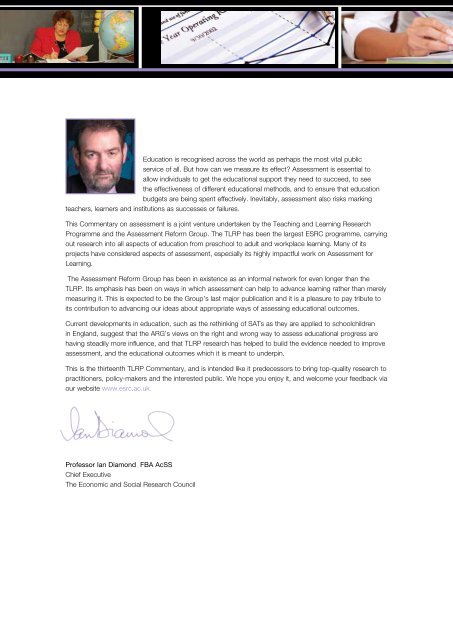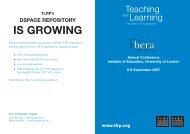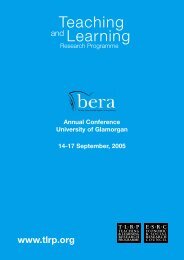Assessment in schools Fit for purpose? - Teaching and Learning ...
Assessment in schools Fit for purpose? - Teaching and Learning ...
Assessment in schools Fit for purpose? - Teaching and Learning ...
You also want an ePaper? Increase the reach of your titles
YUMPU automatically turns print PDFs into web optimized ePapers that Google loves.
Education is recognised across the world as perhaps the most vital public<br />
service of all. But how can we measure its effect? <strong>Assessment</strong> is essential to<br />
allow <strong>in</strong>dividuals to get the educational support they need to succeed, to see<br />
the effectiveness of different educational methods, <strong>and</strong> to ensure that education<br />
budgets are be<strong>in</strong>g spent effectively. Inevitably, assessment also risks mark<strong>in</strong>g<br />
teachers, learners <strong>and</strong> <strong>in</strong>stitutions as successes or failures.<br />
This Commentary on assessment is a jo<strong>in</strong>t venture undertaken by the Teach<strong>in</strong>g <strong>and</strong> Learn<strong>in</strong>g Research<br />
Programme <strong>and</strong> the <strong>Assessment</strong> Re<strong>for</strong>m Group. The TLRP has been the largest ESRC programme, carry<strong>in</strong>g<br />
out research <strong>in</strong>to all aspects of education from preschool to adult <strong>and</strong> workplace learn<strong>in</strong>g. Many of its<br />
projects have considered aspects of assessment, especially its highly impactful work on <strong>Assessment</strong> <strong>for</strong><br />
Learn<strong>in</strong>g.<br />
The <strong>Assessment</strong> Re<strong>for</strong>m Group has been <strong>in</strong> existence as an <strong>in</strong><strong>for</strong>mal network <strong>for</strong> even longer than the<br />
TLRP. Its emphasis has been on ways <strong>in</strong> which assessment can help to advance learn<strong>in</strong>g rather than merely<br />
measur<strong>in</strong>g it. This is expected to be the Group’s last major publication <strong>and</strong> it is a pleasure to pay tribute to<br />
its contribution to advanc<strong>in</strong>g our ideas about appropriate ways of assess<strong>in</strong>g educational outcomes.<br />
Current developments <strong>in</strong> education, such as the reth<strong>in</strong>k<strong>in</strong>g of SATs as they are applied to schoolchildren<br />
<strong>in</strong> Engl<strong>and</strong>, suggest that the ARG’s views on the right <strong>and</strong> wrong way to assess educational progress are<br />
hav<strong>in</strong>g steadily more <strong>in</strong>fluence, <strong>and</strong> that TLRP research has helped to build the evidence needed to improve<br />
assessment, <strong>and</strong> the educational outcomes which it is meant to underp<strong>in</strong>.<br />
This is the thirteenth TLRP Commentary, <strong>and</strong> is <strong>in</strong>tended like it predecessors to br<strong>in</strong>g top-quality research to<br />
practitioners, policy-makers <strong>and</strong> the <strong>in</strong>terested public. We hope you enjoy it, <strong>and</strong> welcome your feedback via<br />
our website www.esrc.ac.uk.<br />
Professor Ian Diamond FBA AcSS<br />
Chief Executive<br />
The Economic <strong>and</strong> Social Research Council

















